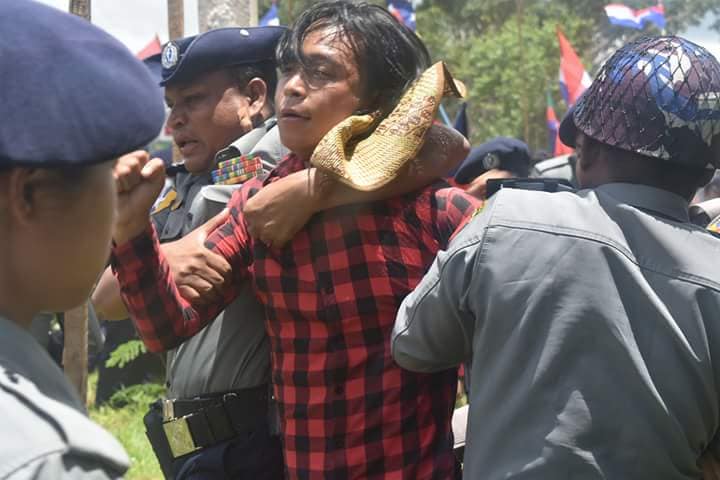Police violently cracked down on a 1,000-person protest yesterday on the streets of Loikaw, the capital of Kayah State. The marchers were protesting the planned erection of a bronze statue of General Aung San, Myanmar’s national hero and father of State Counsellor Aung San Suu Kyi.
The protesters, like other members of ethnic minority groups across Myanmar, oppose the erection of Aung San statues because they see it as an attempt to erase their unique histories and as extension of the political repression they face at the hands of the Myanmar government.
“We still don’t have self-determination yet; we are still asking for these rights as supposedly equal partners. Erecting a General Aung San statue in this situation adds insult and injury to our people’s dreams and weakens our people’s trust in the local government. That’s why we have to oppose the establishment of this statue,” said protester Khun Bernard Bote in a speech that was livestreamed on a Facebook page run by the Karenni National Progressive Party, which has maintained a separatist struggle with the Myanmar government since 1957.
The protest came to an impasse when police tried to block the demonstrators from entering a public square, known as a hittaing kwin, in front of the Kayah State parliament. Police claimed the protesters had not included the hittaing kwin in their application for a permit to protest. Police also said they had received orders from Naypyidaw to stop the protest because of public safety concerns.
Violence broke out when a protester named Khun Philip Soe Aung walked past the police barricade.
“I had both of my hands up when I walked towards the police. They treated me brutally. They tasered, beaten, handcuffed, and arrested me. This is the people’s police brutalizing the people,” he said.
After the arrest, the other protesters waited behind the barricade while singing songs, waving flags, and chanting as leaders negotiated with the police for passage into the hittaing kwin.
After over an hour of growing restlessness, the protesters began to force their way past the police, who responded with tasers, batons and shields. The zap of tasers, screams of pain, and shouting amidst the fighting could be heard in livestreamed videos from the scene.
By the end, 10 protesters were arrested and charged under sections 505(b) and 505(c) of the Penal Code, which outlaws the dissemination of information with the intent to incite unrest. It carries a penalty of up to two years in prison.
‘Writing its own history’
Since the Aung San Suu Kyi’s National League for Democracy took over the civilian government in 2016, it has carried out a constant effort to place the name and image of General Aung San on a variety of publicly used objects, including the country’s currency to bridges. These moves, as well as the erection of bronze statues of the late general, have been met with resistance in areas with high concentrations of ethnic minorities.
According to a report released yesterday by the Transnational Institute to coincide with the protest, the melee in Loikaw is a microcosm of the struggle ethnic minorities face around Myanmar.
Kayah State “reflects many of the challenges in peace-building and socio-political transition that need resolution in Myanmar at large: political impasse, a multiplicity of conflict actors, contested natural resources, land grabbing, humanitarian suffering, and divided communities seeking to rebuild after more than six decades of civil war,” the report says.
Despite the opposition, the statue is still scheduled to be erected on Martyr’s Day on July 19 — the 71st anniversary of Aung San’s assassination — in Loikaw’s Gandha Hay Wun Park.
In his speech at the protest, Khun Bernard Bote affirmed the movement’s commitment to protecting its heritage.
“Because we live in Kayah State, we have to learn our history. Because we live on this land, we drink its water, we eat the rice from this land. We have to be thankful and respect the history, the people. We deserve a voice,” he said.
“The [NLD government] is writing its own history today.”


